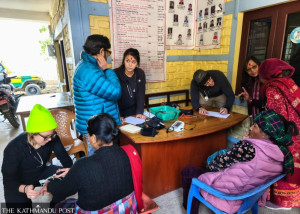Health
CRM Nepal conducts lab test of CAR-T cell therapy
This is the first time the treatment technology is tested successfully in Nepal, the organisation says.
Post Report
Centre for Regenerative Medicine Nepal (CRM Nepal) has successfully conducted a test of the US FDA-certified CD-19 CAR in the laboratory.
According to the CRM Nepal, this is the first time that such an advanced treatment technology is tested successfully in Nepal and that it aims to indigenously produce the CAR-T cell in the GMP laboratory for human use.
"So far, the groundbreaking CAR-T cell therapy is limited to developed countries; it is gradually being tested in low- and middle-income countries. In Nepal, the CRM Nepal is working with a primary aim to introduce this advanced technology for cancer treatment in Nepal," the CRM Nepal, which conducted the test recently, said in a statement on Saturday.
"CAR-T cell is a leading advanced technology with very successful results in Acute Lymphoblastic Leukemia (ALL) and Non-Hodgkin Lymphoma (NHL) cancer patients," Dr Sanjivan Gautam, CRM Nepal consultant, is quoted as saying in the statement.
He said that introducing this technology in Nepal was quite a challenging task as the reagents and equipment used in the test are very expensive and sophisticated.
"Although the therapy costs about 30 to 50 million rupees in developed countries, the CRM Nepal aims to make this therapy available to Nepali cancer patients at one-tenth of the cost in developed countries," Dr Gautam said.
Surgery, chemotherapy and radiation therapy are widely used methods for cancer treatment in countries around the world, including Nepal.
The CRM Nepal initially aims to make this therapy available to about 100 blood cancer patients per year, said Dr Ramila Shipakar, a member of the CRM research team and assistant professor of Oncology at the National Academy of Medical Sciences (NAMS).
According to Dr. Sudhamshu KC, a CRM Nepal member and professor at NAMS, the major challenges of bringing in CAR-T Cell therapy in Nepal are the lack of regulatory framework and inadequate information to both patients and doctors. KC said studies carried out in high income countries have shown that CAR-T Cell therapy in addition to cancer is equally effective in fatty liver, diabetes, autoimmune and cardiovascular diseases preclinically.
As the availability of CAR-T Cell therapy increases, it is most likely to be a major component of healthcare management of cancer patients in low-, middle- and high-income countries, says Dr Om Kurmi from Coventry University, UK.
"It is important for regulatory bodies such the Department of Drug Administration (DDA) and Nepal Health Research Council to facilitate the introduction of this CAR-T Cell by bringing in appropriate laws and regulations," said Dr Kurmi.
Geneticist Balram Gautam said the method has its own complications as the necessary infrastructure and components are imported from western countries. "Most of the ingredients have to be imported in frozen condition, which adds to the cost and complexity of transportation," geneticist Gautam added.
So far, the US FDA has approved 6 CAR-T Cells. The CRM Nepal aims to bring these approved products in Nepal with the approval of the DDA. According to Dr Sanjivan Gautam, the CRM Nepal is working to produce CAR-T Cell in Nepal through collaboration and cooperation with American, German and Brazilian organisations.
It is estimated that it will take another year to bring CAR-T Cell to human use in Nepal, the CRM Nepal said. "This successful laboratory test is the first time that it has been tested in a Nepali laboratory. In the pre-clinical test carried out in Nepali laboratory, T-cells from healthy donors contained up to 50 percent CAR which is likely to destroy 90 percent of B-Cell cancer in 24 hours," it said. "At the same time, these CAR-T cells produced sufficient amounts of cancer-killing effects or molecules."
With the emergence of biotherapy, this technology is gaining momentum for cancer treatment in developed countries, it said. The CRM Nepal said that amongst biotherapy, CAR-T Cell has been found to be highly effective in the treatment of cancer. Earlier studies published in top-scientific journals by researchers from the National Cancer Institute (NCI) and the University of Pennsylvania based in the USA have reported that 90 percent of terminally ill B-cell cancer patients have been completely cured, it said.




 10.12°C Kathmandu
10.12°C Kathmandu













